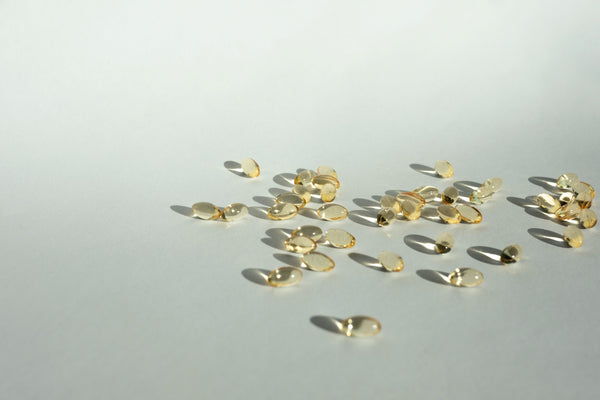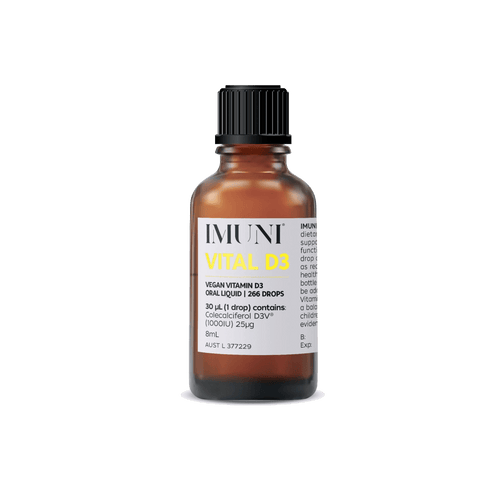According to The Australian Bureau of Statistics 1 in 4 Australian adults suffer with vitamin D deficiency. Could you be one of them? Here’s how to recognise the symptoms of vitamin D deficiency, and what you can do to treat it.
Feeling fatigued? Low mood? General malaise? It could mean you’re not getting enough natural sunlight exposure. We live in one of the sunniest countries in the world, yet 1 in 4 Australians are diagnosed as vitamin D deficient each year.
Vitamin D is a hormone that promotes the absorption of calcium in the body. It’s essential for everything from healthy bones and muscles to strong heart function and immunity. It’s even been said to stave off fatigue, depression, weight gain, and even cancer.
Your body naturally produces it when you expose your skin to the sun. But when you don’t get enough, you could be putting yourself at risk of other illnesses too — from respiratory infections to weak bones to diabetes.
Here’s why vitamin D is essential for your health, how to recognise the symptoms of vitamin D deficiency, and what you can do if you’re not getting enough.
What is Vitamin D and Why Do We Need It?
Vitamin D is often referred to as “the sunshine vitamin”, quite simply because your body produces vitamin D naturally when it’s directly exposed to sunlight. Vitamin D can also be absorbed by the body through diet — with certain foods and supplements — to ensure that you have adequate levels in your blood.
Your body needs vitamin D to absorb calcium, promote bone growth and strengthen the immune system. It basically keeps your body healthy and your immune system strong enough to fight off infections, which is essential in winter when cold and flu season is rife. The irony is that in winter, when people need vitamin D the most, most of us are not getting enough, so the risk of illness is even higher if your vitamin D levels are low.
How Do We Get More Vitamin D?
Vitamin D is made in the skin after it’s been exposed to the sun. The same UVB rays that cause sunburn also make vitamin D. Sunscreen, darker skin pigmentation, clothing and reduced daylight in winter diminish the skin’s ability to make vitamin D. Dark-skinned individuals are more likely than fair-skinned individuals to be low for vitamin D year-round, because darker skin blocks the UVB rays from producing vitamin D.
It can also be found in oily fish (mackerel, tuna and sardines), mushrooms and fortified dairy and non-dairy substitutes. Although it’s difficult to obtain enough vitamin D from diet alone, so you can also take supplements to increase your levels.
How Long Should We Spend in the Sun?
The amount of time you need in the sun depends on several things, including where you live, the season, time of day, your skin colour and the amount of skin exposed. However, during summer, most people can get adequate vitamin D from just 5-10 minutes outside.
It’s important to avoid the high UV times, so mid-morning or mid afternoon is best. Always follow safe sun guidelines because too much sun can increase your risk of skin cancer and may cause the vitamin D in your skin to break down.
From May to August, if you have fair to olive skin, experts recommend two to three hours of midday sun exposure to the face, arms and hands, spread across the duration of a week.
What Happens if I Don't Get Enough Vitamin D?
Moderate to severe vitamin D deficiency can lead to rickets (soft bones) in infants and children.
Low vitamin D levels can lead to osteoporosis and increase your risk of falls and fractures (broken bones) if you’re over 50. Osteoporosis occurs when your bones lose calcium and other minerals, making them fragile and more likely to break. Vitamin D helps your body to absorb calcium, while not having enough can increase your risk of developing osteoporosis.
People with very low levels of vitamin D (moderate to severe deficiency) are at risk of developing further health problems, such as cardiovascular disease, severe asthma in children, and some studies even show a correlation between vitamin D deficiency and cancer. It’s also thought that vitamin D could play a role in the prevention and treatment of type1 and type 2 diabetes, glucose intolerance and multiple sclerosis.
But there are also a number of symptoms commonly ignored or overlooked, that could be a sign you’re suffering with vitamin D deficiency. These include tiredness, muscle pain, low mood and frequent coughs and colds. It’s important to recognise the signs early, before they develop into anything more sinister.
What are the Symptoms of Vitamin D Deficiency?
These are the signs and symptoms to look out for – if you’ve been experiencing even one for prolonged periods of time, it’s worth talking to your doctor, or getting a vitamin D test.
Symptom #1: You’re constantly tired
This is commonly overlooked by doctors. Studies have shown that very low blood levels of vitamin D can cause chronic fatigue.
Symptom #2: You suffer with muscle pain
According to experts, muscle weakness can be a key symptom, because vitamin D plays a key role in muscle function. Of course, muscle pain can be caused by exercise, or perhaps you’re restricting your calories to lose weight (another root cause). But if you’re feeling your muscle strength suffer regularly, mention it when you talk to your GP, especially if you’re experiencing it along with other symptoms on this list.
Symptom #3: You feel depressed
During the winter, it can be easy to blame the weather on your low mood. But if your mood persists, it’s worth having your vitamin D levels checked. Studies have shown that people with low vitamin D are at a much greater risk of depression and anxiety. Research also suggests that vitamin D may help modulate levels of neurotransmitters such as serotonin within the brain, which is important for mood regulation, and melatonin, which regulates our sleep. Low levels of either hormone could have a direct impact on your mental health.
Symptom #4: You can’t shift that cold
One of vitamin D’s most important roles is keeping your immune system strong enough to fight off viruses and bacteria that cause illness and infection. If you can’t seem to shift that cough or cold, it could be that your vitamin D levels are too low, and your immune system is suffering as a result.
Symptom #5: Your bones ache
Vitamin D is essential for bone health — it promotes the absorption of calcium in the body, which in turn promotes healthy bone growth. If you suffer with constant aches and pains, and you can’t quite pinpoint the exact place the pain comes from, it could be vitamin D deficiency. Particularly if you suffer with lower back pain.
Low vitamin D levels can also lead to osteoporosis later in life — when your bones lose calcium and other minerals, making them fragile and more likely to break. It’s important, therefore, to test your vitamin D levels as early as possible if you do suffer with aches and pains, to prevent osteoporosis from developing.
Who is at Risk of Vitamin D Deficiency?
You may be at risk of vitamin D deficiency if you:
- stay mostly indoors for health, work or other reasons=
- have naturally dark skin
- cover your body for religious or cultural reasons
- avoid the sun for skin protection or due to medical reasons
- are obese
- have a health condition that affects vitamin D absorption from your diet
- take medicines that cause vitamin D to break down
- are a baby of a vitamin D deficient mother
How Do I Get Tested for Vitamin D Deficiency?
You can simply visit your GP and tell them your symptoms. They’ll be able to run a blood test to identify your D levels and prescribe a course of treatment for you.
What About Vitamin D Supplements?
Most people don’t need vitamin D supplements. There can be side effects if you have too much vitamin D in your body. If you are vitamin D deficient, talk to your doctor for advice on whether to start taking supplements.
Vitamin D supplements are available over the counter and in different forms, including capsules, tablets, soluble tablets, chewable tablets, powder and liquids. Your doctor or pharmacist can advise you on the best one for you based on the strength of the medicine, the number and type of active ingredients it contains, and your reason for taking it.
Here are our pharmacist, Daniel Zhou’s recommendations.
You can also browse our entire collection of Vitamin D


Loved our advice on vitamin D deficiency? We've got plenty more health advice on our Health & Wellness Edit, guaranteed to give your body a well-deserved boost. Is your child's coughing keeping you up at night? Here are 8 cough remedies to speed up their recovery. Plus, do you know the difference between over-the-counter and practitioner-only supplements? Here's everything you need to know.













 // Dotdigital pop up code //
// Dotdigital pop up code //